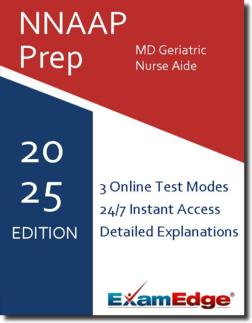NNAAP MD Geriatric Nurse Aide Practice Tests & Test Prep by Exam Edge - Topics
Based on 25 Reviews
- Real Exam Simulation: Timed questions and matching content build comfort for your NNAAP MD Geriatric Nurse Aide test day.
- Instant, 24/7 Access: Web-based NNAAP Maryland Geriatric Nurse Aide practice exams with no software needed.
- Clear Explanations: Step-by-step answers and explanations for your NNAAP exam to strengthen understanding.
- Boosted Confidence: Reduces anxiety and improves test-taking skills to ace your NNAAP Maryland Geriatric Nurse Aide .

Understanding the exact breakdown of the NNAAP Maryland Geriatric Nurse Aide test will help you know what to expect and how to most effectively prepare. The NNAAP Maryland Geriatric Nurse Aide has 70 multiple-choice questions The exam will be broken down into the sections below:
| NNAAP Maryland Geriatric Nurse Aide Exam Blueprint | ||
|---|---|---|
| Domain Name | % | Number of Questions |
| Physical Care Skills - Activities of Daily Living | 14% | 10 |
| Physical Care Skills - Basic Nursing Skills | 39% | 27 |
| Physical Care Skills - Restorative Skills | 8% | 6 |
| Psychosocial Care Skills - Emotional and Mental Health Needs | 11% | 8 |
| Psychosocial Care Skills - Spiritual and Cultural Needs | 2% | 1 |
| Role of the NA - Communication | 8% | 6 |
| Role of the NA - Client Rights | 7% | 5 |
| Role of the NA - Legal and Ethical Behavior | 3% | 2 |
| Role of the NA - Member of the Health Care Team | 8% | 6 |


